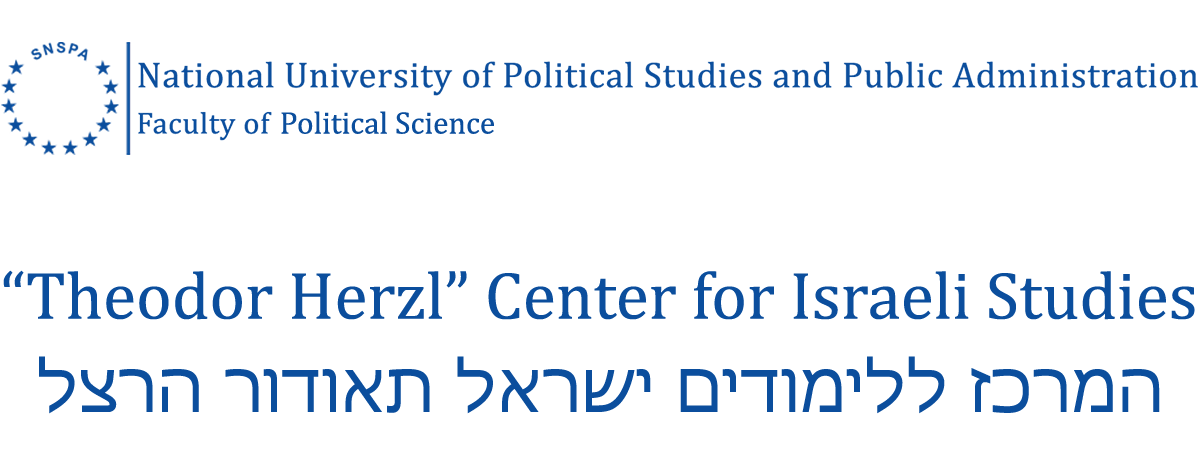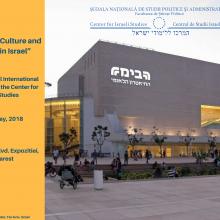Policy of Culture and Memory in Israel
On 22nd-23rd of May 2018, the Center for Israeli Studies (CISs) from the National University of Political Studies and Public Administration (SNSPA) organized the conference “Policy of Culture and Memory in Israel”. The lecturers are members of the academic communities from Romania, Israel, the United Kingdom, the Czech Republic and Poland as well as professionals in the fields of media and culture.
At the opening session, the welcome speech was held by Remus Pricopie, Rector of National University of Political Studies and Public Administration, followed by Liliana Popescu, Vice Rector SNSPA, Andrei Țăranu, Vice Dean, Faculty of Political Science, Liviu Rotman, Director, Center for Israeli Studies. A message of Avraham Duvdevani, Chair of the World Zionist Organization, was transmitted by Dubi Bergman, Director FRD World Zionist Organization.
The first session was moderated by Liliana Popescu, followed by lectures of Aviva Halamish, Director and Editor-in-Chief, The Open University of Israel Press, “Israeli Perception of Europe: The Role of Nostalgia, Negation of Exile and Search for Identity”; Dan Korn, IDC Hezliya, Israel,”Explaining the Reemergence of Social Identities in Israel Politics”; Orit Galili Zucker, Independent researcher, Israel, “A Unique Political Culture: The Problematic Relations of Israel’s Media towards Its Governmental Institutions”; David Tal, Yossi Harel Chair in Israel Studies, Department of History & Art, University of Sussex, Brighton, United Kingdom, “The Politics and Politicization of the Arab Jews”
The second session was opened by Aaron T. Walter, Adjunct Professor, Masaryk University, Faculty of Social Studies; Department of International Relations and European Studies, Brno, Czech Republic, “Friend, and Ally: Case study of Czechoslovak and Israeli cultural identity through nation-building”, followed by Ana Maria Bolborici, Department of Sociology and Communication, Transilvania University of Brașov, Romania,“Perspectives on the Israeli-Jewish collective memory and the Israeli-Palestinian conflict”; Ewa Wegrzyn, Institute of Jewish Studies, Jagellonian University, Krakow, Poland, ” The Immigration of Polish Jews to Israel after the Second World War and the Cultivation of Polishness in the New Homeland”.
The third session was moderated by Aviva Halamish, followed by Alexander Hausvater, Theatre director, Israel & Romania, “The impact of politics and culture in Israel”; Lou Gelehrter, Architect, Jerusalem, Israel, ”Jewish Space and Israel”; Irina Ana Drobot, Lecturer, Technical University of Civil Engineering, Bucharest, Romania, “National Identity and Yehuda Amichai’s Poetry”; Adina Babeș, Senior researcher, Elie Wiesel National Institute for the Study of Holocaust in Romania; “History teaching in Israel during its three stages (case study: Holocaust history teaching).
The last session was opened by Eugenia Mihalcea, PhD candidate, University of Haifa, Israel “Between memories and memorialization policies”; Alon Helled, PhD candidate in "Social and Political Change", Universities of Turin and Florence, Italy “Telling the Story of a Politicized National History: The Generations of Israeli Historians”; Michael Shafir, Department of International Studies, Babes-Bolyai University Cluj Napoca, Romania, “Zionism’s “Isms”: Democratism, Judaism, Socialism, and Nationalism.

